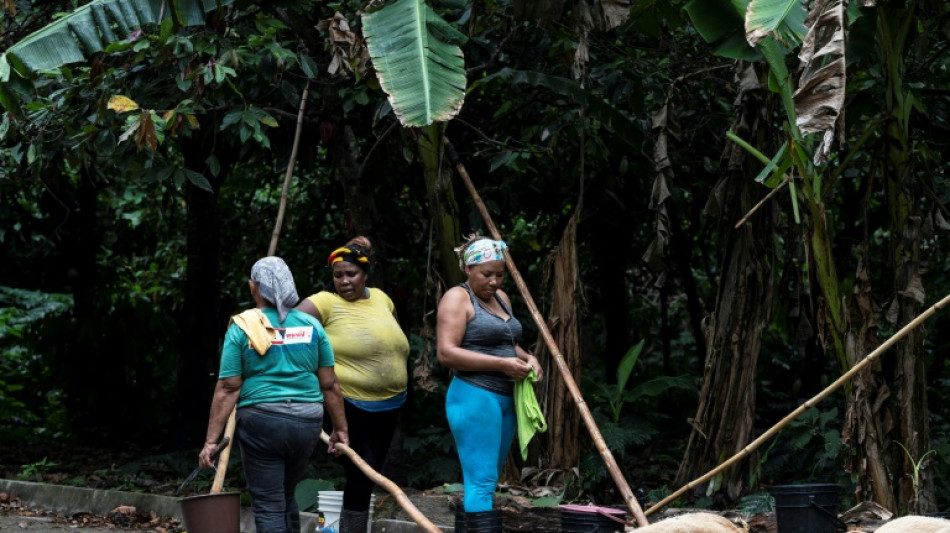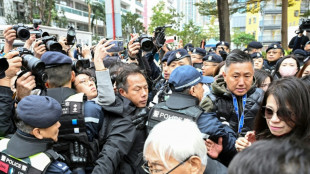
-
 Machado ally 'kidnapped' after calling for Venezuela elections
Machado ally 'kidnapped' after calling for Venezuela elections
-
Epstein affair triggers crisis of trust in Norway

-
 AI chatbots give bad health advice, research finds
AI chatbots give bad health advice, research finds
-
Iran steps up arrests while remaining positive on US talks

-
 Frank issues rallying cry for 'desperate' Tottenham
Frank issues rallying cry for 'desperate' Tottenham
-
South Africa pile up 213-4 against Canada in T20 World Cup

-
 Brazil seeks to restore block of Rumble video app
Brazil seeks to restore block of Rumble video app
-
Gu's hopes of Olympic triple gold dashed, Vonn still in hospital

-
 Pressure mounts on UK's Starmer as Scottish Labour leader urges him to quit
Pressure mounts on UK's Starmer as Scottish Labour leader urges him to quit
-
Macron backs ripping up vines as French wine sales dive

-
 Olympic freeski star Eileen Gu 'carrying weight of two countries'
Olympic freeski star Eileen Gu 'carrying weight of two countries'
-
Bank of France governor Francois Villeroy de Galhau to step down in June

-
 Tokyo stocks strike record high after Japanese premier wins vote
Tokyo stocks strike record high after Japanese premier wins vote
-
'I need to improve', says Haaland after barren spell

-
 Italian suspect questioned over Sarajevo 'weekend snipers' killings: reports
Italian suspect questioned over Sarajevo 'weekend snipers' killings: reports
-
Von Allmen at the double as Nef seals Olympic team combined gold

-
 Newlyweds, but rivals, as Olympic duo pursue skeleton dreams
Newlyweds, but rivals, as Olympic duo pursue skeleton dreams
-
Carrick sees 'a lot more to do' to earn Man Utd job

-
 Olympic star Chloe Kim calls for 'compassion' after Trump attack on US teammate
Olympic star Chloe Kim calls for 'compassion' after Trump attack on US teammate
-
'All the pressure' on Pakistan as USA out to inflict another T20 shock

-
 Starmer vows to remain as UK PM amid Epstein fallout
Starmer vows to remain as UK PM amid Epstein fallout
-
Howe would 'step aside' if right for Newcastle

-
 Sakamoto wants 'no regrets' as gold beckons in Olympic finale
Sakamoto wants 'no regrets' as gold beckons in Olympic finale
-
What next for Vonn after painful end of Olympic dream?

-
 Brain training reduces dementia risk by 25%, study finds
Brain training reduces dementia risk by 25%, study finds
-
Gremaud ends Gu's hopes of Olympic treble in freeski slopestyle

-
 Shiffrin and Johnson paired in Winter Olympics team combined
Shiffrin and Johnson paired in Winter Olympics team combined
-
UK's Starmer scrambles to limit Epstein fallout as aides quit

-
 US skater Malinin 'full of confidence' after first Olympic gold
US skater Malinin 'full of confidence' after first Olympic gold
-
Sydney police pepper spray protesters during rallies against Israeli president's visit

-
 Israel says killed four militants exiting Gaza tunnel
Israel says killed four militants exiting Gaza tunnel
-
Franzoni sets pace in Olympic team combined

-
 Captain's injury agony mars 'emotional' Italy debut at T20 World Cup
Captain's injury agony mars 'emotional' Italy debut at T20 World Cup
-
Family matters: Thaksin's party down, maybe not out

-
 African players in Europe: Ouattara fires another winner for Bees
African players in Europe: Ouattara fires another winner for Bees
-
Pressure grows on UK's Starmer over Epstein fallout

-
 Music world mourns Ghana's Ebo Taylor, founding father of highlife
Music world mourns Ghana's Ebo Taylor, founding father of highlife
-
HK mogul's ex-workers 'broke down in tears' as they watched sentencing

-
 JD Vance set for Armenia, Azerbaijan trip
JD Vance set for Armenia, Azerbaijan trip
-
Sydney police deploy pepper spray as Israeli president's visit sparks protests

-
 EU warns Meta it must open up WhatsApp to rival AI chatbots
EU warns Meta it must open up WhatsApp to rival AI chatbots
-
Scotland spoil Italy's T20 World Cup debut with big win

-
 Israeli president says 'we will overcome evil' at Bondi Beach
Israeli president says 'we will overcome evil' at Bondi Beach
-
Munsey leads Scotland to 207-4 against Italy at T20 World Cup

-
 Japan restarts world's biggest nuclear plant again
Japan restarts world's biggest nuclear plant again
-
Bangladesh poll rivals rally on final day of campaign

-
 Third impeachment case filed against Philippine VP Duterte
Third impeachment case filed against Philippine VP Duterte
-
Wallaby winger Nawaqanitawase heads to Japan

-
 Thailand's Anutin rides wave of nationalism to election victory
Thailand's Anutin rides wave of nationalism to election victory
-
Venezuela's Machado says ally kidnapped by armed men after his release

| SCS | 0.12% | 16.14 | $ | |
| CMSD | 0.14% | 23.983 | $ | |
| CMSC | -0.05% | 23.56 | $ | |
| RIO | 2.95% | 96.249 | $ | |
| RBGPF | 0.12% | 82.5 | $ | |
| BTI | -3.08% | 60.925 | $ | |
| BCE | 1.69% | 25.51 | $ | |
| NGG | -0.32% | 87.775 | $ | |
| JRI | -1.41% | 12.79 | $ | |
| BP | 0.45% | 39.185 | $ | |
| GSK | -2.55% | 58.735 | $ | |
| VOD | 2.07% | 15.43 | $ | |
| RELX | -0.38% | 29.27 | $ | |
| RYCEF | 2.65% | 17.34 | $ | |
| AZN | -1.98% | 189.29 | $ | |
| BCC | -0.7% | 90.4 | $ |

Venezuela town finds sweet success in artisanal chocolate
Armed with rubber boots and a sharp machete, Nidia Chavez heads to the plantation in search of "black gold" -- not a reference to Venezuela's plentiful oil, but rather cocoa.
In Chuao, in the northern state of Aragua, this type of black gold means everything in a town that has built a large part of its economy on labor-intensive, artisanal chocolate production.
"It is the black gold that we have here, this is what we live on," Chavez, 43, told AFP after collecting three containers of the fruit.
With the help of her machete, Chavez and her companions cut the cocoa into two to extract the pulp.
But there is an important rule in Chuao, inhabited by the descendants of slaves brought from Africa: Don't pluck the cocoa fruits unless you're a farmworker. It applies to both tourists and locals alike.
"It is forbidden," said Mauricio Sosa, 48, a boat operator and tour guide. "If not, we would be without cocoa," because the seed "is very tasty."
It's tempting, as the burgundy and yellow fruits abound around the town and all the way down to the coast.
Instead, the 18 to 20 tons of cocoa produced in Chuao each year are sold en masse by the Empresa Campesina Chuao, a civil society organization, to a businessman with close ties to the community. The prized chocolates made from the cocoa always note the origins.
A kilo (2.2 lbs) of cocoa beans can sell for about $10.
- 'Our pride' -
Estilita Ache was born 63 years ago in this remote village of about 3,000, which is most easily accessed by the sea. The other option is a multiday trek through mountains and jungle.
"Cocoa is everything," she said. "It's special. It must be, because you grab it with love."
Freshly extracted seeds lay in the fermentation room, covered by banana leaves, as women joke around in the old, wooden structure about gifts they want for Mother's Day.
It's suffocatingly hot inside -- a perfect environment for the seeds to acquire the ideal flavor and texture.
They're then dried in the sun, and packed in 61-kilo (134-lb) sacks.
This old-school process doesn't allow for mistakes, as any error would affect the quality of the product.
Empresa Campesina Chuao aims to produce "100 percent pure" cocoa. Vicenta Gamez, 66, points to a selection of chocolates, spreads, punch and tea that she prepares with her son, Robin Herrera, 28.
"We don't have big machines to prepare all this," she said with a smile. "Our cocoa is our greatest pride -- and the best in the world."
G.Stevens--AMWN



